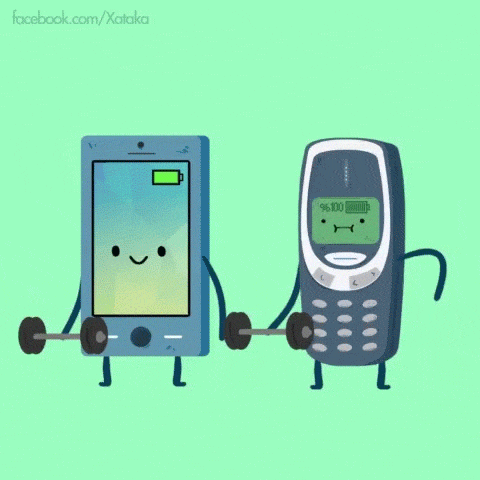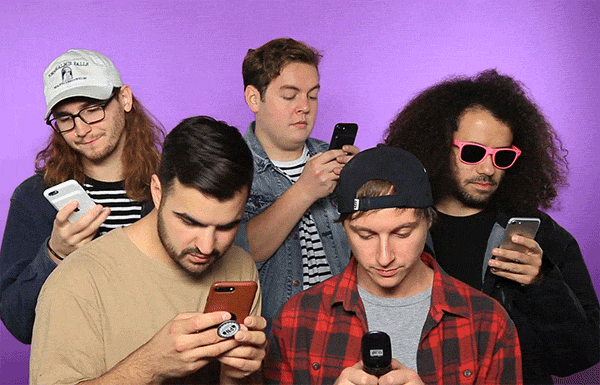If you’re already someone that sweats the small stuff, you may be well aware of the stress that texting can add to your life. Heck, even if you’re literally #chill (can’t relate) and aren’t likely to lose sleep over that too niche joke you made to your coworkers that didn’t land — texting can still be a strain on your mental wellbeing. If you’ve ever panicked about someone not texting you back or lost sleep wondering if you chose the wrong emoji, understanding the psychology behind texting anxiety can be super enlightening in knowing how to deal with the stress that can come from texting.
"Texting anxiety is the distress some people experience when waiting for a reply from a text that they have sent, or the distress related to a text that has been received that raises unexpected questions/concerns," Forrest Talley, Ph.D told Southern Living. "The impact is that this anxiety adds to one’s daily stress, is a distraction, and frequently leads people to spend unnecessary time attempting to resolve the tension that has now arisen." While texts gets sent virtually in some sort of cyberspace no one really understands, the stress from texting is totally real and happens IRL. And if you’ve texted someone four times in a row only to *immediately* regret it or if you’ve looked at a long text from an ex with doom in your heart — you are in good company.
As a 2017 study by Asurion, a global tech protection and support company reported, the average American cannot go more than 10 minutes without reaching for their phone. Of the study’s 2,000 participants, 10 percent grabbed their phones every four minutes. That’s 15 times in an hour. Though on average, participants were willing/able to manage going phoneless and free for four whole hours (a little more than five episodes of Real Housewives of Atlanta with no commercials), they certainly weren’t happy about it. And with 60 percent reporting occasional waves of uneasiness and 31 percent reporting constant anxiety when their phone was out of reach — it’s clear that the stress one feels from texting isn’t all in their head.
As iconic pop star Lorde says, "I overthink your punctuation use, not my fault, just a thing that my mind do." From overthinking punctuation to emojis to how long between responses, Lorde is totally right, it isn’t your fault, and it is just a thing that your mind does. If your high school health class included visuals of your brain on various substances, you may already be familiar with the neurotransmitter dopamine and all its glory. For those of you who weren’t subject to glossy posters of the brain from the ’80s, dopamine is linked to feelings of pleasure and happiness and feeling a sense of reward. It’s something we’re all after, and something that can be super stimulated by getting a text from a cutie or sending a super funny meme to your partner. Causing the pleasure center to pop off, it may not seem like dopamine would be the source of texting stress, but alas, it may be the culprit. Recent research on dopamine has linked the neurotransmitter to feelings of seeking or longing, in addition to pleasure and receiving, meaning: You get a wave of happy when you send or get a text, but a thunderstorm of reply to me now, when waiting for a response and a monsoon of I will literally never go outside again, if read receipts are involved.
The dopamine can make you excited when your phone lights up, but totally anxious when you see that your text was read. This cycle can create a sort of loop, like periods or bad fashion, that can seem never ending. Dopamine looping is put on overdrive with the instant nature of texting. After years of smart phone conditioning, your brain is used to instant access to everything it wants. With your brain in the habit of getting waves of dopamine instantly — like, from Googling that actress in that indie movie to seamlessly namedrop her to your new Bumble boo or buying Boy Brow the second it goes on sale — you start to expect a reply instantly, and low-key lose it when you don’t get one.
Like a boy in a bad indie band, dopamine thrives off of uncertainty and anticipation. Wanting someone to reply makes you want them to reply more, and not knowing what they are going to say makes you unable to not be thinking about it. Recent brain scan studies reported that the brain is more active when it’s anticipating something, rather than when it literally receives it. Meaning you may be checking your phone in the shower, à la He’s Just Not That Into You, expecting and daydreaming about the amazing response you’re going to get, and when you finally get it, your brain may not be super phased. Weird flex there brain, but OK.
Of course, if you’re texting a new cutie, someone from a dating app you haven’t met IRL yet, or are in a tense convo with a partner or hookup, there could be some *social* anxieties disguising as inbox-related stress. “There’s a huge amount of chance and uncontrollability,” Natasha Schull, a professor of media, culture, and communication at New York University told Tonic. “You can’t really rest when you have an action out in the world and you haven’t gotten the feedback yet. You get in a heightened state of agitation.” If you’re worried that you’re annoying someone, that they’re not going to like you back, or they’ll think you’re smart and funny and brilliant (which you obviously are) or are being "too much" — the uncertainty of texting, compared to say, face-to-face interactions, can totally crank up the anxiety you’re feeling. And with ghosting or leaving people on read on the rise, it’s easy to assume the worst when you haven’t heard from someone you’ve been texting.
If you’re feeling texting uneasiness with a partner, it may be helpful to talk in person about healthy phone boundaries or to move big conversations from texting to calling. You know your boo cares deeply about you, and if you’re feeling any sort of stress from your phone interaction, it’s totally OK to ask for some clarification. If you’re feeling texting stress with a new boo, it may be because you’re not super comfy with them yet (which is totally valid!). Meeting in person or calling them on the phone may help to gauge what their communication style is, and though it may seem intimidating to discuss texting etiquette with someone new, the discomfort you may feel in the moment could be totally worth getting on the same page for the foreseeable future. If you need your boo to text you back in a timely manner, or if you don’t like to text during school or work, it’s also OK to establish some healthy boundaries, no matter how many dates you’ve been on.
If you’re feeling plagued by texting anxiety, there are some awesome ways you can start to suppress the stress. Try having dinner with friends and making everyone put their phones in a pile or spending one night a week with your phone off. Ask people to call you instead of text you, or talk to the people you’re texting about a realistic texting timeline. Make a list of everything you love about yourself, all your accomplishments, and everything you’re proud of in your life and refer back to it when you’re holding your breathe waiting for a reply. If you’re really feeling spicy, go out to lunch or to the store or to a friend’s and leave your phone at home — you may be happy you did.
Don’t let the digital aspects fool you, feeling stress from texting is physically real. If you’re feeling uneasy about an unread message or if three exclamation points were too many, there may be some dopamine to blame. Of course, you are amazing and anyone who is texting you is lucky to be in your inbox — and that is something you can unabashedly leave on read.
Source: Read Full Article



